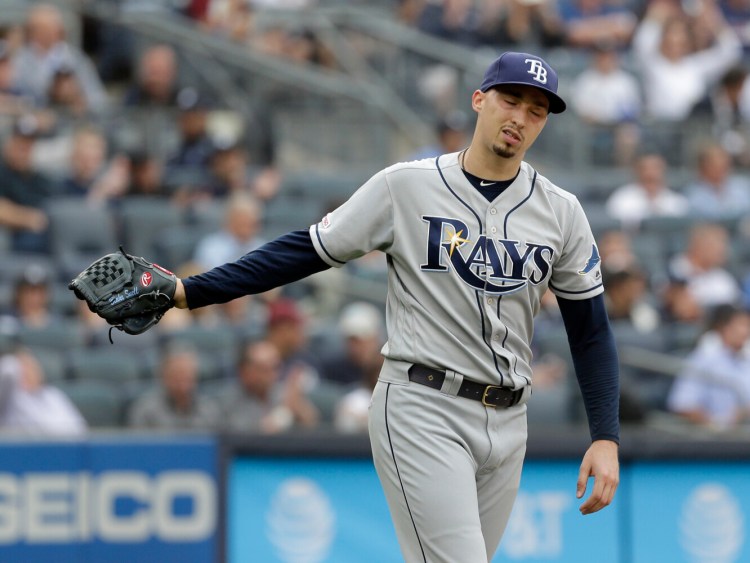There are no reports of Major League Baseball owners sending flowers to Blake Snell. But they must be so appreciative of Snell, the 27-year-old knucklehead with the golden pitching arm, and not-so-silver tongue.
Snell’s diatribe against MLB’s proposal for starting the season this summer was prime propaganda for the owners. Here we have MLB wanting to resume baseball – something so many of us want. What could stop it? What if the players refuse to play?
One Snell quote made headlines across the country, including in this newspaper:
“I’m not playing unless I get mine.”
During this COVID-19 pandemic crisis, with thousands dying, millions unemployed and healthcare workers risking their lives, a professional baseball player – who signed a five-year, $50 million contract last year – prioritizes the importance of his own checkbook.
Snell also talked about the risk of playing during an pandemic – “If I get the ‘rona” – but that was overshadowed by his foolish remarks about being paid (for the record, Snell already received $286,500 this year, even if he doesn’t play, as part of a “good faith” deal MLB made with the players’ union in March).
Snell’s “mine” comment only bolsters the “selfish, out-of-touch” stereotype of professional athletes. I still remember NBA player Latrell Sprewell turning down a three-year, $21 million contract in 2004, explaining that “I have my family to feed.”
We are headed for a public-relations battle. MLB Commissioner Rob Manfred has offered heartfelt comments that baseball “will be part of the recovery, the healing in this country, from this particular pandemic,” he said in an ESPN interview. Manfred referred to the 9/11 tragedy in 2001, and how the resumption of baseball a week later lifted spirits.
“We hope that we can play a similar role with respect to this (pandemic).”
So, here we have the commissioner saying baseball can help. Then MLB proposes a plan to start the schedule in July. Then … Blake Snell.
But it is not as simple as that.
First and foremost, would it be safe to play?
That was another pitcher’s reaction when the MLB made its proposal – to play games in empty stadiums, starting in July. People focus on the money – which is why Snell’s outburst made headlines – but Washington Nationals pitcher Sean Doolittle offered a more rational response to MLB’s proposal, in a series of statements on Twitter:
“It feels like the conversation about an MLB restart has shifted to the economic issues and that’s really frustrating,” Doolittle said.
“We need to consider what level of risk we’re willing to assume. Eighty percent of the cases are considered mild, but what if a player, a staff member, an auxiliary worker, or a family member gets a case that’s in the 20 percent, and they develop severe symptoms or chronic issues?
“Some people are telling me to stay home if I don’t want to play. We’re asking these questions BECAUSE we want to play. We want to restart the season again. We also want everyone (who is involved in resuming) a baseball season to be as safe as possible.”
Without keeping everyone in quarantine – an unfeasible option – people may come down with symptoms of the virus. But can MLB contain it? Manfred has said a player testing positive would be removed from his team, but the team would continue playing. Can MLB guarantee there would not be a rapid spread of the virus within a team?
Maybe, by July, such concerns can be addressed.
But, again, there is the money.
Back in late March, MLB and the players made an agreement about service time – 2020 will count as a full year of service, toward free agency and other benefits, whether games are played or not. MLB would also pay a $170 million “advance” to the players, which would not have to be returned if no games are played (which is why Snell already got $286,500). If play resumed, players were to receive prorated salaries, based on games played.
But apparently there was enough wiggle room in that agreement that MLB owners reneged on the prorated idea. Claiming that they will lose money with no fans in attendance, they offered revenue sharing instead.
The owners had to know revenue sharing is a deal breaker. Revenue sharing puts a limit on salaries – a salary cap – and that is something the players’ union has never agreed to. Remember the 1994 strike that canceled the remainder of the season? It was over revenue sharing.
But the owners still tried to sneak it in last week. Were they leveraging the pandemic – and the nation’s desire for baseball – against the players?
The owners will not openly say the season is in jeopardy because of selfish baseball players. No reason for such derision; not when they have Blake Snell speaking up.
Copy the Story LinkComments are not available on this story.
Send questions/comments to the editors.



